Nitecore NU50 Headlamp Review
The Nitecore NU50 headlamp offers dual white emitters as well as a single red, with USB-C charging and a built-in 21700! A complete package!
Official Specs and Features
Here’s a link to the Nitecore NU50 headlamp product page.
Versions
I believe there’s just one version of the Nitecore NU50 headlamp.
Price
The Nitecore NU50 headlamp is selling now for $64.95 at NitecoreStore.com.
Short Review
The Nitecore NU50 headlamp has a great headband and even without an over-the-top band, feels very secure. That’s with a built-in 21700 cell, too. The headlamp offers a lot without being overly complicated.
Long Review
The Big Table
| Nitecore NU50 Headlamp | |
|---|---|
| Emitter: | Unstated |
| Price in USD at publication time: | $64.95 at NitecoreStore.com |
| Cell: | Internal |
| Runtime Graphs | |
| LVP? | ? (Probably) |
| Switch Type: | E-Switch |
| Quiescent Current (mA): | ? |
| On-Board Charging? | Yes |
| Charge Port Type: | USB-C |
| Charge Graph | |
| Power off Charge Port | all modes |
| Claimed Lumens (lm) | 1400 |
| Measured Lumens (at 30s) | 502 (35.9% of claim)^ (massive stepdown happens after around 28 seconds) |
| Candela per Lumen | 3.3 |
| Claimed Throw (m) | 130 |
| Candela (Calculated) in cd (at 30s) | 178lux @ 4.991m = 4434cd |
| Throw (Calculated) (m) | 133.2 (102.5% of claim)^ |
| Claimed CCT | – |
| Measured CCT Range (K) | 5400-5900 Kelvin |
| Item provided for review by: | NitecoreStore.com |
| All my Nitecore reviews! | |
^ Measurement disclaimer: Testing flashlights is my hobby. I use hobbyist-level equipment for testing, including some I made myself. Try not to get buried in the details of manufacturer specifications versus measurements recorded here; A certain amount of difference (say, 10 or 15%) is perfectly reasonable.
What’s Included
- Nitecore NU50 headlamp
- Charging cable (USB to USB-C)
- Manual
Package and Manual
Build Quality and Disassembly
Most or all of the Nitecore NU50 headlamp is plastic, but it still has a very robust feel. Regarding disassembly; there is none here. The 21700 that’s included is built-in, and not really user serviceable.
The light doesn’t really even come out of the headband (easily, at least.) So essentially nothing comes off or apart on the NU50.
That’s not really too bad, I suppose, for a certain consumer market that will never want to take a headlamp apart.
Size and Comps
Dimensions L-3.28″xW-1.91″xH-1.73″
Weight 5.15oz
If the flashlight will headstand, I’ll show it here (usually the third photo). If the flashlight will tailstand, I’ll also show that (usually in the fourth photo).
Here’s the test light with the venerable Convoy S2+. Mine’s a custom “baked” edition Nichia 219b triple. A very nice 18650 light.
Also above on the left is a new feature light!! Laulima Metal Craft sent this titanium Todai for some size comparison photos like the ones above. Laulima has a bunch of incredible items. I’ve tested one (the Laulima Metal Craft Hoku) (the official site for Hoku is here) that was a Friend Fund Friday review. I was impressed enough by that Hoku that I bought a Laulima Metal Craft Diamond Slim (also in tumbled aluminum) (review is upcoming!) These lights by Laulima have impeccable build quality and not only that, they’re quite configurable. There are some (great, actually) default configurations, but Joshua Dawson (of Laulima Metal Craft) is open to ideas and emitter options and the like. I haven’t reviewed this Todai, but I have to say, it feels absolutely fantastic and I love it thus far. (Notably, I love how warm and eggy those emitters look through the TIR.)
Retention and Carry
The Nitecore NU50 is a headlamp and only a headlamp. No right angle, no pocket clip, nothing else. It lives on the headband and really isn’t made for being removed from the headband.
That’s all fine! Because who doesn’t need a good headlamp? You can see in the plastic part below that the headband can be removed. Removing the light from the mount, though, is much harder!
The headband itself is fantastic. It’s stretchy, and comfortable, and despite the 21700 light being appropriately heavy, it rides well. You might even be able to use this as a running headlamp.
Power and Runtime
A built-in 21700 cell powers the Nitecore NU50 headlamp. It being built-in is a huge downside – I really want to be able to change the cell! I couldn’t get the “tailcap” to budge though.
Of course, the light went together somehow so with the right level of determination and toolset, it’s definitely able to be taken apart (whether it can be put back together or not, I don’t know.)
The Nitecore NU50 headlamp has one of my least favorite features: a proximity sensor. What’s worse is that (at least according to what I could see in the manual), this sensor can’t be disabled. So the outputs you see below are calculations, and thus estimates (I mean everything I do is estimates, right? But this is a different kind of estimate?)
I double-checked that turbo output to confirm that it steps down right around 30 seconds, and it does. I’m sure the goal is for it to step down after 30 seconds so that the FL-1 output is recorded at 1500 lumens, but that’s not my experience. I’d much rather have a steady 800 lumens or whatever than 28 seconds of 1500 lumens. But still, once you know this, it’s a manageable thing – just expect a few minutes around 500 lumens, not 1500.
Note that before running this test, I hadn’t digested the manual, which says that after 30 seconds the NU50 will return to the previous state. So it doesn’t really “step down” (necessarily, specifically), it just goes back to “whatever.” This seems like a worse behavior than simply stepping to the next level down BUT I appreciate that it’s not a random behavior, and is written specifically this way. So it’s a wash – a win and a loss here.
Since the cell is built-in, I can’t check what the ending voltage is.
Charging
Along with the built-in cell comes built-in charging. This is by way of a USB-C port on the side. When worn properly, the USB-C port is on your left hand.
There’s also a battery indicator, which displays four dots, where four lit blue dots is “full.” Pushing the small circle button will activate the battery indicator when the light is off.
Charging is good and fairly quick, at around 2 and a quarter hours. C to C and A to C both work.
Modes and Currents
| Mode | Mode Claimed Output (lm) | Claimed Runtime | Measured Lumens | |
|---|---|---|---|---|
| Turbo | 1400 | – | 1626 (0s) 502 (30s) |
|
| High | 600 | 11h | 599 | |
| Mid | 300 | 16h | 309 | |
| Low | 100 | 31h | 106 | |
| Ultralow | 8 | 180h | 10 |
Pulse Width Modulation
None of the levels use PWM. The mode order is lowest to highest, with the right-most being the red steady output (and this order is the same in the below-sequenced photos).
Here you can see a “baseline” – a chart with almost no light hitting the sensor.
Then there’s the Ultrafire WF-602C flashlight, which has some of the worst PWM I’ve seen. It’s so bad that I used a post about it to explain PWM! Here are multiple timescales (10ms, 5ms, 2ms, 1ms, 0.5ms, 0.2ms) to make comparing this “worst” PWM light to the test light easier. That post also explains why I didn’t test the WF-602C at the usual 50us scale.
User Interface and Operation
Two switches are used to control the Nitecore NU50 headlamp. I found the user interface to be a little how-ya-doin’ because I just sort of had to yolo and push buttons til I got what I wanted. I handle a ton of lights though, and don’t always memorize every user interface. If you use this light frequently, the user interface will become second nature quickly.
The two buttons should probably go on the “top” when the NU50 is being worn. There’s a big rectangle button that has a power icon – that’s the power button. The other, a smaller round button, is for mode changes (specifically switching between primary (white) and secondary (red) emitters).
Here’s a user interface table!
| State | Action | Result |
|---|---|---|
| Off | Click Mode button | Battery indicator |
| Off | Click Power button | No change in state |
| Off | Hold Power button | Low |
| Off | Double click Power button | Ultralow |
| On | Click power button | Mode advance (LMH only) |
| On | Double click Power button | Turbo |
| Turbo | Press Power button | Return to previous state (or will return to previous state after 30 seconds anyway) |
| On | Hold Power button | Off |
| Off | Hold Mode button | Red on (low/steady) |
| On | Click Mode button | Switch between red and white output |
| Red On | Double click Power button | No change |
| Red On | Click Power button | Red mode advance (Red steady, Red flashing) |
| White on | Double click Mode | SOS (White) |
| SOS | Click Power button | Switch between SOS and Beacon |
| Off | Hold both buttons | Lockout |
| Lockout | Hold both buttons | Unlock to Ultralow |
LED and Beam
Nitecore doesn’t tell what either emitter (white or red) is. Both use a TIR. The darker circle seen below is the proximity sensor (that can’t be disabled).
LED Color Report (CRI and CCT)
CCT ranges from around 5400K to around 5900K, which is fairly reasonable for Neutral to Cool white. The CRI is low, at around 70. The right two photos are both red – red has two levels, but the higher level is blinky only. I captured that here anyway.
Beamshots
These beamshots always have the following settings: f8, ISO100, 0.3s shutter, and manual 5000K exposure. These photos are taken at floor level, and the beam hits the ceiling around 9 feet away.
Tint vs BLF-348 (KillzoneFlashlights.com 219b version) (affiliate link)
I keep the test flashlight on the left and the BLF-348 reference flashlight on the right.
I compare everything to the KillzoneFlashlights.com 219b BLF-348 because it’s inexpensive and has the best tint!
Conclusion
What I like
- Reasonable price
- Incorporates red output
- Very comfortable headband
- USB-C charging works well
- In the user interface, both low and ultralow are available from off!
What I don’t like
- Built-in (not serviceable) 21700
- Greenish output
- Proximity sensor (and it can’t be disabled!)
Notes
- This content originally appeared at zeroair.org. Please visit there for the best experience!
- For flashlight-related patches, stickers, and gear, head over to PhotonPhreaks.com!
- Please use my amazon.com referral link to help support zeroair.org!
- Please support me on Patreon! I deeply appreciate your support!



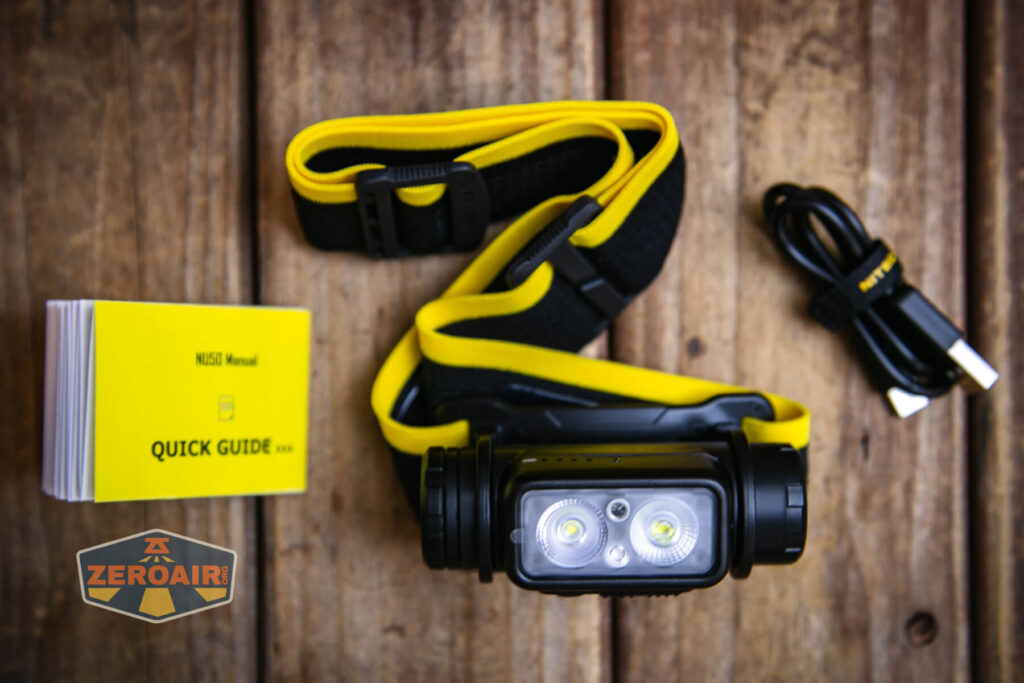




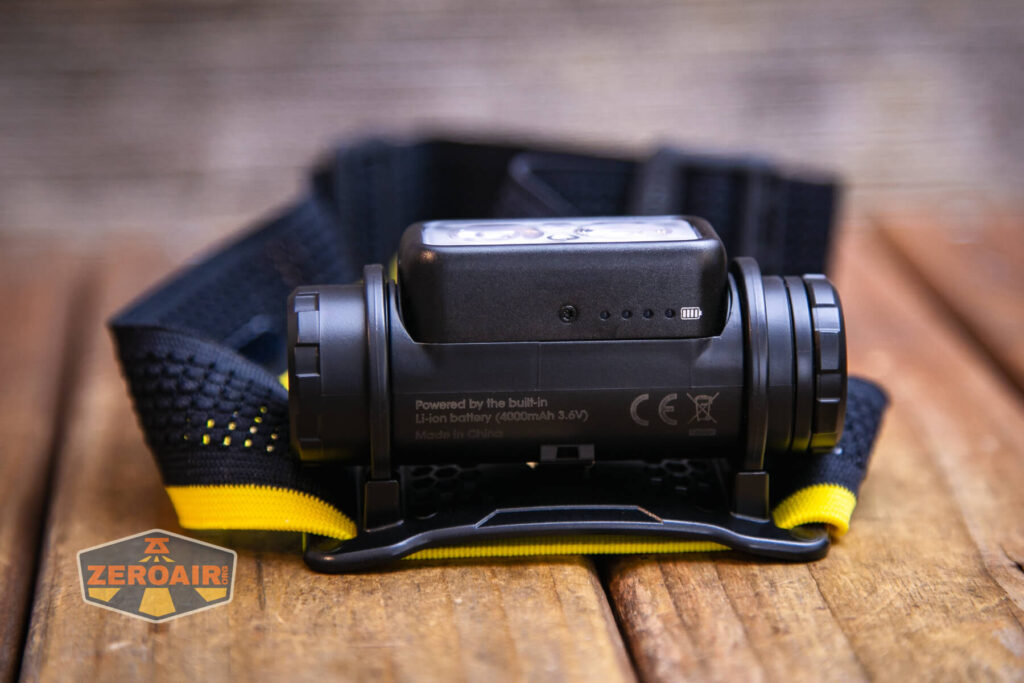

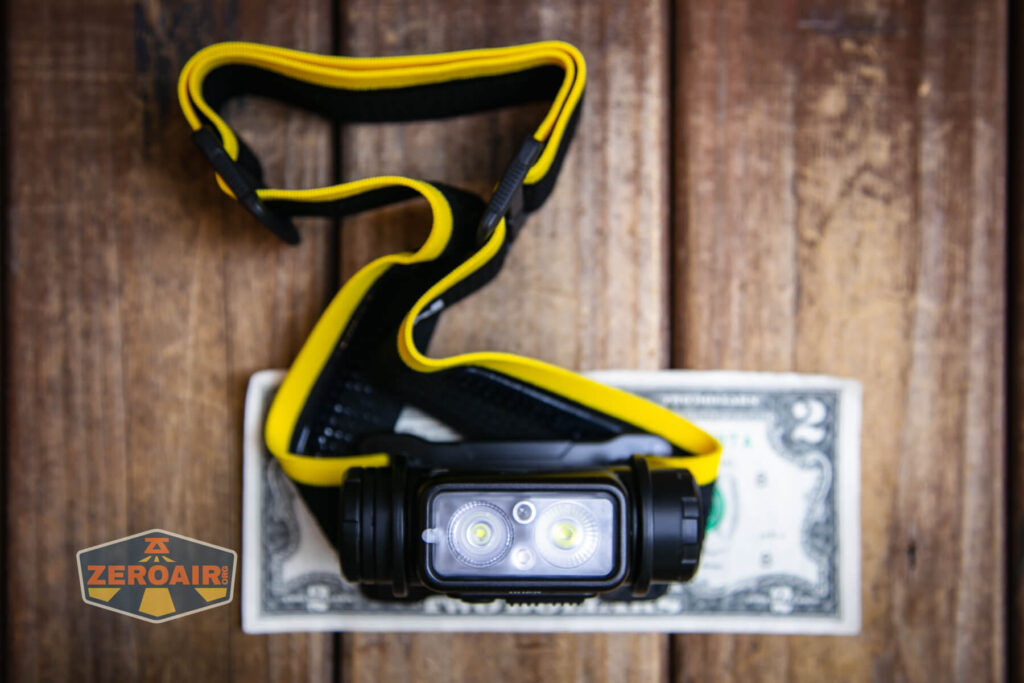

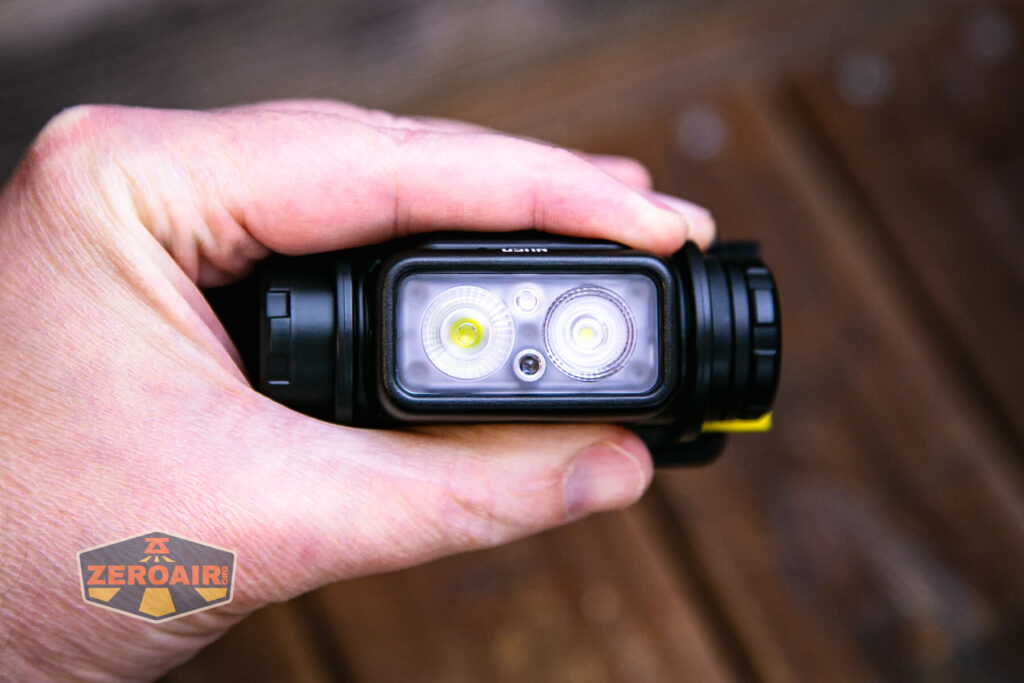














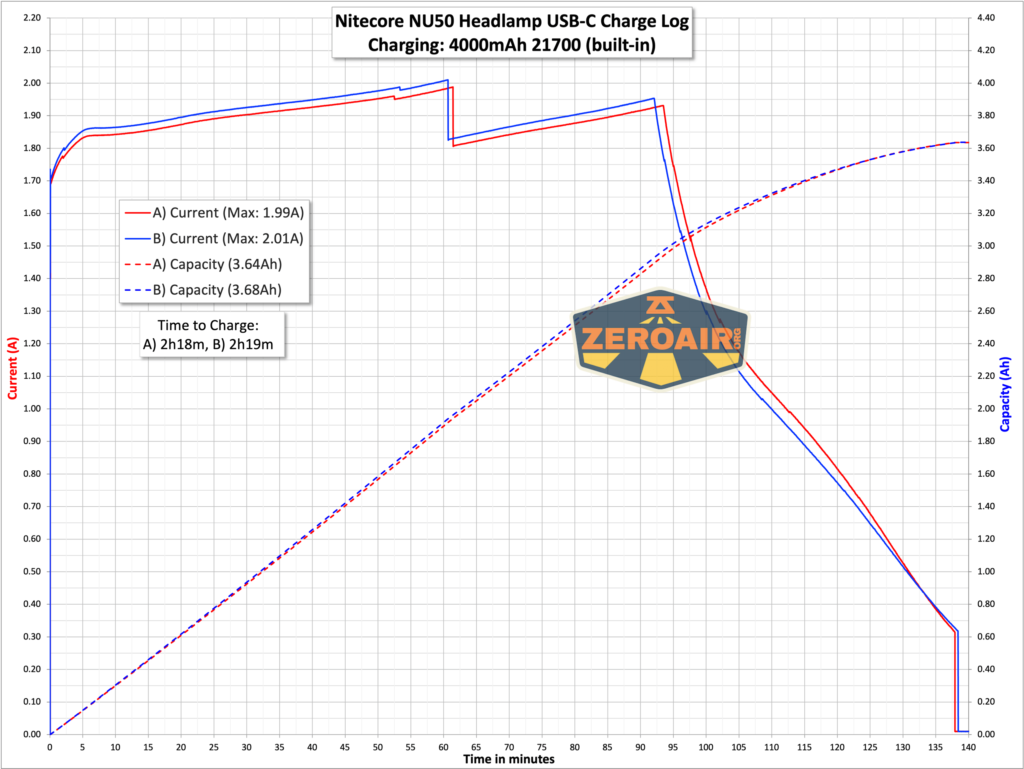


































Thank you for excelent review. Based on the parameter comparison I prefere almost the same Nitecore NU43 which uses the built-in 18650 akku. It is much lighter (146 vs. 116 g) and only 1 hour shorter run time.